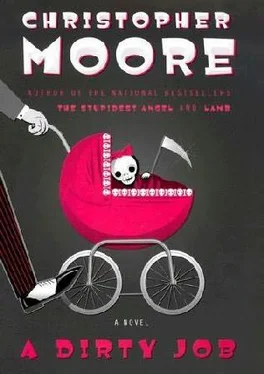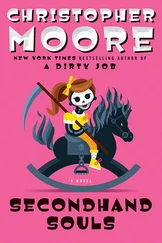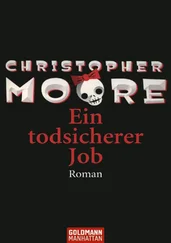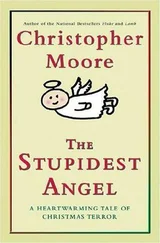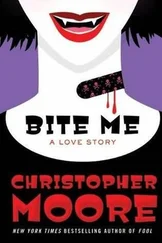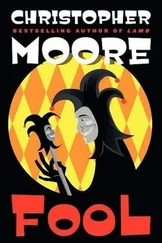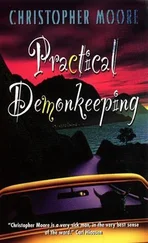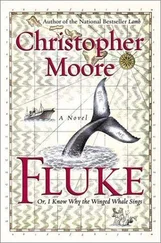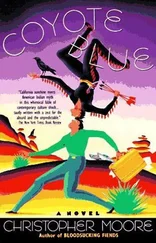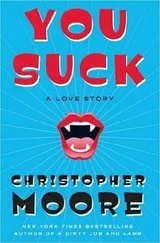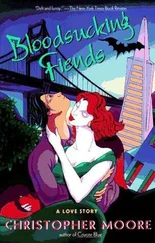“And you just mailed it out?”
“I sent it certified mail!” Fresh boomed. “Someone at your store signed for it. I think I did my part.”
“Okay, sorry, go on.”
“Anyway, when I got to the Castro it was a very sad place. The only guys you saw on the street were very old or very young, all the ones in the middle were either dead or sick with HIV, walking with canes, towing oxygen cylinders. Death was everywhere. It’s like there needed to be a soul way station, and I was here, trading records. Then the book showed up in the mail. There were a lot of souls coming in. For those first few years I was picking up vessels every day, sometimes two or three times a day. You’d be surprised how many gay men have their souls in their music.”
“Have you sold them all?”
“No. They come in, they go out. There’s always some inventory.”
“But how can you be sure the right person gets the right soul?”
“Not my problem, is it?” Mr. Fresh shrugged. He’d worried about it at first, but it seemed to all happen as it should, and he’d gotten into the rhythm of trusting whatever mechanism or power was behind all of this.
“Well, if that’s your attitude, why do it at all? I don’t want this job. I have a job, and a kid.”
“You have to do it. Believe me, after I got the book, I tried not doing it. We all did. At least the ones I’ve talked to did. I’m guessing you’ve already seen what happens if you don’t. You’ll start hearing the voices, then the shades start coming. The book calls them Underworlders.”
“The giant ravens? Them?”
“They were just indistinct shadows and voices until you showed up. There’s something going on. Starting with you, and continuing with you. You let them get a soul vessel, didn’t you?”
“Me? You said there’s a bunch of Death Merchants.”
“The others know better. It was you. You fucked up. I thought I saw one flying over earlier in the week. Then today, I was out walking, and the voices were bad. Really bad. That’s when I called you. It was you, wasn’t it?”
Charlie nodded. “I didn’t know. How could I know?”
“So they got one?”
“Two,” Charlie said. “A hand came out of the sewer. It was my first day.”
“Well, that’s it,” said Fresh, cradling his head in his hands. “We are most certainly fucked now.”
“You don’t know that,” Charlie said, trying to look on the bright side. “We could have been fucked before. I mean, we run secondhand stores for dead people, that’s sort of a definition of fucked .”
Mr. Fresh looked up. “The book says if we don’t do our jobs everything could go dark, become like the Underworld. I don’t know what the Underworld is like, Mr. Asher, but I’ve caught some of the road show from there a couple of times, and I’m not interested in finding out. How ’bout you?”
“Maybe it’s Oakland,” Charlie said.
“What’s Oakland?”
“The Underworld.”
“Oakland is not the Underworld!” Mr. Fresh leapt to his feet; he was not a violent man, you really didn’t have to be when you were his size, but—
“The Tenderloin?” Charlie suggested.
“Don’t make me smack you. Neither of us wants that, do we, Mr. Asher?”
Charlie shook his head. “I’ve seen the ravens,” Charlie said, “but I haven’t heard any voices. What voices?”
“They talk to you when you’re on the street. Sometimes you’ll hear a voice coming out of a heating vent, a downspout, sometimes a storm drain. It’s them, all right. Female voices, taunting. I’ve gone years without hearing them, I’ll almost forget, then I’ll be going to pick up a vessel, and one will call to me. I used to phone the other merchants, ask them if they’d done something, but we stopped that right away.”
“Why?”
“Because that’s part of what we think brings them up. We’re not supposed to have any contact. It took us a while to figure that out. I had only found six of the merchants in the city back then, and we were having lunch once a week, talking about what we knew, comparing notes—that’s when we saw the first of the shades. In fact, just to be safe, this will be the last time that you and I have contact.” Mr. Fresh shrugged again and began to untie Charlie’s bonds, thinking: It all changed that day at the hospital. This guy has changed everything, and I’m sending him out like a lamb to the slaughter—or maybe he’s the one to do the slaughtering. This guy might be the one—
“Wait, I don’t know anything,” Charlie pleaded. “You can’t just send me out to do this without more background. What about my daughter? How do I know who to sell the souls to?” He was panicked and trying to ask all the questions before he was set free. “What are the numbers after the names? Do you get the names like that? How long do I have to do this before I can retire. Why are you always dressed in mint green?” As Mr. Fresh untied one ankle, Charlie was trying to tie the other back to the chair.
“My name,” said Mr. Fresh.
“Pardon?” Charlie stopped tying himself up.
“I dress in mint green because of my first name. It’s Minty.”
Charlie completely forgot what he was worried about. “Minty? Your name is Minty Fresh?”
Charlie appeared to be trying to stifle a sneeze, but then snorted an explosive laugh. Then ducked.
9
THE DRAGON, THE BEAR, AND THE FISH
In the hallway of the third floor of Charlie’s building, a meeting was going on between the great powers of Asia: Mrs. Ling and Mrs. Korjev. Mrs. Ling, by holding Sophie, had the strategic advantage, while Mrs. Korjev, who was fully twice the size of Mrs. Ling, possessed the threat of massive retaliatory force. What they had in common, besides being widows and immigrants, was a deep love for little Sophie, a precarious grasp on the English language, and a passionate lack of confidence in Charlie Asher’s ability to raise his daughter alone.
“He is angry when he leave today. Like bear,” said Mrs. Korjev, who was possessed of an atavistic compulsion toward ursine simile.
“He say no poke,” said Mrs. Ling, who limited herself to English verbs in the present tense only, as a devotion to her Chan Buddhist beliefs, or so she claimed. “Who give poke to baby?”
“Pork is good for child. Make her grow strong,” said Mrs. Korjev, who then quickly added, “like bear.”
“He say it turn her into shih tzu. Shih tzu is dog. What kind father think little girl turn into dog?” Mrs. Ling was especially protective of little girls, as she had grown up in a province of China where each morning a man with a cart came around to collect the bodies of baby girls who had been born during the night and hurled into the street. She was lucky that her own mother had spirited her away to the fields and refused to come home until the new daughter was accepted as part of the family.
“Not shih tzu,” corrected Mrs. Korjev. “Shiksa.”
“Okay, shiksa. Dog is dog,” said Mrs. Ling. “Is irresponsible.” Not once was the letter r heard in Mrs. Ling’s pronunciation of irresponsible .
“Is Yiddish word for not a Jew girl. Rachel is Jew, you know.” Mrs. Korjev, unlike most of the Russian immigrants left in the neighborhood, was not a Jew. Her people had come from the steppes of Russia, and she was, in fact, descended from Cossacks—not generally considered a Hebrew-friendly race. She atoned for the sins of her ancestors by being ferociously protective (not unlike a mother bear) of Rachel, and now Sophie.
“The flowers need water today,” said Mrs. Korjev.
At the end of the hallway was a large bay window that looked out on the building across the street and a window box full of red geraniums. On afternoons, the two great Asian powers would stand in the hallway, admire the flowers, talk of the cost of things, and complain about the increasing discomfort of their shoes. Neither dared start her own window box of geraniums, lest it appear that she had stolen the idea from across the street, and in the process set off an escalating window-box competition that could ultimately end in bloodshed. They agreed, tacitly, to admire—but not covet—the red flowers.
Читать дальше
